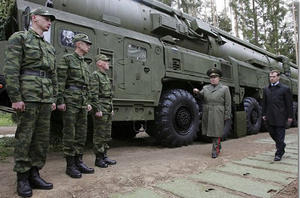Nuclear mattersSenate to ratify New START pact today
The New START pact passed a key procedural hurdle on Tuesday when the Senate voted to bring the weapons pact between the United States and Russia to the floor of the Senate for a final vote, which is likely to be held today, Wednesday; the Senate voted 67-28 to pass a cloture motion, seemingly enough to assure final ratification; eleven Republicans joined with fifty-six Democrats to pass the cloture motion; it will take sixty-seven votes to ratify the New START pact; even if the U.S. arsenal is reduced by 30 percent, as stipulated in New START, the United States would still have 1,550 deployed strategic nuclear warheads; there are signs that these aging systems need refurbishing and modernization — and the $80 billion over ten years earmarked for this purpose is a good investment

Medvedev inspects a Russian nuclear missile asset // Source: armybase.us
The strategic nuclear arms treaty passed a key procedural hurdle on Tuesday when the Senate voted to bring the weapons pact between the United States and Russia to the floor of the Senate for a final vote.
The Senate voted 67-28 to pass a cloture motion, seemingly enough to assure final ratification. Eleven Republicans joined with fifty-six Democrats to pass the cloture motion.
It will take sixty-seven votes to ratify the New START pact, which would give the Obama administration its top foreign policy goal in the lame-duck session.
The final vote is likely to be held today, Wednesday, and it now appears that the Senate will approve the treaty.
Even if the U.S. Congress ratifies the New Strategic Arms Reduction Treaty (New START), signed by President Barack Obama and the Russian prime minister, Dmitry Medvedev, in April, the White House has already announced support earlier this year for $80 billion of funds (pdf) over the next decade to sustain and modernize the U.S. nuclear weapons stockpile, a 10 percent increase from existing funding levels.
Phil McKenna writes asking whether this new infusion of funding undermine the spirit of the treaty, by perpetuating America’s “military-industrial complex,” as arms control advocates and left-leaning bloggers have claimed? Or is it a savvy investment, needed to maintain even a reduced stockpile of weapons?
At first blush, the money appears to be a political scheme by Obama to secure Republican votes for arms reduction, McKenna says. Even if the U.S. arsenal is reduced by 30 percent, as stipulated in New START, the United States would still have 1,550 deployed strategic nuclear warheads. There are signs that the new funds are needed to maintain this.
The U.S. systems are decades old and none has been fully tested (that is, detonated) since the United States stopped underground testing in 1992. Instead, each year the National Nuclear Security Administration tests individual parts of nuclear weapons to ensure the weapons’ viability.
An independent study released in 2009 found the U.S. existing nuclear arsenal could last for decades (pdf), but cautioned that “all options for extending the life of the nuclear weapons stockpile rely on the continuing maintenance and renewal of expertise and capabilities in science, technology, engineering, and production unique to the nuclear weapons program.”
McKenna notes that in March 2010, the directors of the U.S. three nuclear weapons laboratories challenged the study’s findings. They warned Congress that “federal programs to extend the life of the nation’s aging nuclear arsenal are insufficient to guarantee the viability of the weapons for decades to come,” the New York Times reported.
George H. Miller, director of the Lawrence Livermore National Laboratory, told the New York Times that the main findings of the panel’s report “understate, in my view, the challenges and risks encountered in ensuring a safe and reliable nuclear force.”
Since then the directors of the three nuclear laboratories and Richard Lugar, a leading Senate Republican, have come out in support of New START and the plan to increase funding for the maintenance of the existing arsenal.
If they are right, spending $80 billion over ten years to maintain an existing arsenal does not seem like such a bad idea.
Will the New START treaty be ratified? On Sunday, two prominent Republican senators signaled that they would not support the New START, shortly after a Republican-sponsored amendment that might have scuppered the treaty was defeated by Obama supporters.
Senate Majority Leader, Democrat Harry Reid, said a final vote on the treaty would be held before Congress leaves this week.
